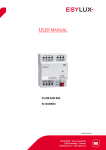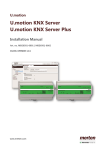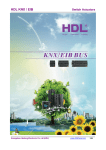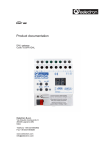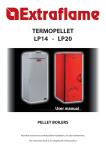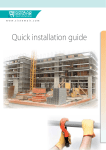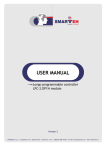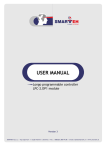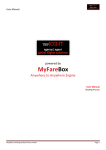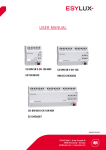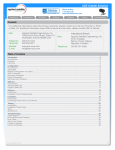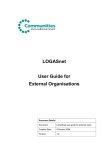Download HOTEL ROOM MANAGEMENT SYSTEM - specifications
Transcript
HOTEL ROOM MANAGEMENT SYSTEM - specifications OVERVIEW The purpose of this this specification document is to define the main features and guide lines for the Hotel Room Management System, which includes Access Control, Guest Management, & Building Management Systems; in compliance with standards such as to ensure guest comfort and security, as well as open protocol and architecture to be operated with Building Management System, energy saving and eco friendly oriented. HRMS shall be based on S-Mode KNX technology (international standard for Home and Building Automation systems) in order to guarantee: o interoperability with different brands o integration with other systems (for example HVAC systems) o easy modification of the system functions and products (from different contractors with different brands) and easy extension of installations o maintenance over the years o different kinds of cabling topologies (tree/star/mixed) The system shall not be based on a single centralized room-control unit: each device shall be able to perform the required functions directly (each component has resident intelligence enabling direct dialogue with all the devices in the network) in order to prevent the global shutdown of the room in case of damage of single unit. HOTEL ROOM MANAGEMENT SYSTEM - specifications HRMS should be integrated into a IP backbone in order to integrate other BMS (CCTV, HVAC, Alarm Systems, energy monitoring systems): HRMS and BMS could be managed by a single end workstation. Security Systems will be separately managed by a workstation according to the local Laws and Regulations. HRMS management software shall be integrated into Building Automation System for increasing the level of comfort for the guest. HRMS shall be based on flush mounting and modular devices aesthetically coordinate with wiring devices. These devices shall be equipped with: o Integrated bus interface for easy and fast installation o free inputs and relay outputs in order to reduce the need for additional terminals (space saving on switchgear panels). HOTEL ROOM MANAGEMENT SYSTEM - specifications QUALITY ASSURANCE Work on the KNX installation bus should only be carried out by KNX Factory Trained Integration Specialists. The laying and connecting of the bus cable and the operating devices must comply with the relevant guidelines in accordance with DIN‐VDE. The KNX Integration Specialist must have an ETS training certificate and a current ETS licence. Spare parts shall be available for at least ten years after completion of the HRMS Works DOCUMENTATION Before commencement of the installation, the responsible contractor shall work with the Integration Specialist to produce detailed HRMS design documentation, shop drawings and test plans. At project completion lighting control and/or building control system shop drawings shall be provided to the client as hard (printed) copies and software files (in PDF and either DWG or DXF format). These shall be updated to an “as installed” state prior to acceptance and signoff. INSTALLATION Installation shall be performed by suitably licensed electrical contractors who has completed KNX training, or who are working under the supervision of KNX trained Integration Specialist. MANUFACTURERS LIST All products used within the system being specified shall be certified by the KNX Association and bear the KNX Logo. Manufacturers list may include: Vimar ABB Siemens Schneider PROGRAMMING AND COMMISSIONING KNX programming shall be performed by Factory Trained KNX Integration Specialist. Programming shall be carried out in accordance with this Electrical Specification to be read in conjunction with any electrical schematics. Allow sufficient time to provide a fully working system. Allow time at the projects completion to complete final commissioning to provide a fully functioning system. HOTEL ROOM MANAGEMENT SYSTEM - specifications OPERATIONS AND MAINTENANCE MANUAL Prior to project completion the KNX Integration Specialist shall provide an operation and maintenance manual. The KNX Operation and Maintenance Manual may include the following information: KNX system architecture diagram KNX switchboard layout drawings KNX programming files Floor plans showing KNX devices Recommended scheduled maintenance procedures Technical literature for each type of KNX device used in the project Hospitality Staff Software User Manual NETWORK TOPOLOGY The network topology of the KNX control system shall be flexible and allow devices to be connected in a star, tree, daisy chain or combination of star, tree and daisy chain configuration. The network topology is made up of Lines, Main Lines and Areas. Line: A Line is a local network that supports 64 bus devices and 255 address. It requires a power supply. It is connected up‐stream by either Line couples or IP Routers. Mail Line: A main line will connect up to 12 Lines together via Line Couplers. The Main Line also supports up to 64 bus devices. Each Main Line must have its own power supply. A group of Lines connected to a Main Line is known as an Area. Multiple Areas: Multiple Areas can be linked together using a Backbone Coupler on each Mail Line. Up to 15 Area can be linked together on one Backbone. HORIZONTAL CABLING All the sensors (push buttons, touch screens, dimmers, shutter switches, transponder card readers, brightness and temperature sensors, movement detectors etc.) are linked to the actuators (relays, lighting control devices, shutter motors etc.) via a two‐core bus cable. HOTEL ROOM MANAGEMENT SYSTEM - specifications SYSTEM PROGRAMMING Individual components of the KNX control system shall be configurable across the network using PC software with a Windows® operating system. Each unit that communicates on the network shall be given an address unique to the specific network, and have a serial number which may be retrieved by the configuration software. All units shall provide feedback across the network as to their status. SYSTEM HEAD AND SOFTWARE The KNX control system shall have the option of a comprehensive head end control software. The software shall be multi user with user access control via passwords. The software shall reside on a PC and connect via Ethernet. The system shall provide a graphical representation of the system with indicators showing the status of the inputs and outputs. The software shall be easily configurable and installable, it shall use the database created with ETS4 software by importing the project directly. It shall be equipped with an intuitive user interface, graphically appealing and fully customizable. The main functions of software shall be: overseeing of the entire system and, through a photographic plan, the single environment (rooms/common areas) managing of the room bookings and customer lists time-scheduling of cards access saving and displaying the history of access, alarms and inquiries planning and managing of scenarios and events Moreover, the software shall be able to: supervise temperatures (set-point/speed of fan coil) , I/O, alarms (with acoustic pop-up massage), security, lights (on/off and dimming) and curtains (open/close) or blinds (up/down) manage Guest Room Check-in\Check-out with the possibility of integration with “Property Management System” like “Micros Fidelio” or similar display length of stay, day of departure and other information about guests manage Services and Privileges (creation of cards with services enabling) display the room status (reserved, booked, occupied with identification of guest presence) stop access to single rooms check and manage transit through common areas search and export entry report display service requests manage the records of the hotel’s staff and guests create and manage scenes and commands of virtual devices The software shall have more than two different levels of access in order to provide access only to the functions available for that account or areas of expertise in a specific professional. The software license shall be protected with unique Hardware Key. In order to ensure the local or remote supervision of the system, the architecture of the software shall be “sever-client”: many clients (receptions) can be connected to the same server at the same time. HOTEL ROOM MANAGEMENT SYSTEM - specifications ACCESS CONTROL & CARD PROGRAMMER SYSTEM DESCRIPTION Access control system shall be based on single KNX devices with RF-ID technology (Myfare @ 13MHz standard): external transponder reader to access the room and display the status of the room via the 4 front LEDs; reader with a pocket (card holder) to activate the associated loads or specific scenarios card programmer with USB connection to configure access permissions Access control system shall allow the typical functions of card recognition and electrical lock opening, service activation and scenario control. Card readers shall have freely programmable inputs and outputs in order to make the system really flexible: these inputs/outputs can be used to control sockets (courtesy lights, etc.), room service calls, alarms (ceiling pull, etc.) and energy savings (turning off the heating/airconditioning after detecting an open window, after the leaving of the room, etc.). Access control devices shall be modular and flush mounting; the devices shall be aesthetically coordinated with wiring devices: same colours, shapes, finishings, materials and decorating plates. External reader External reader, enables controlling entry to the rooms where it is installed externally. The transponder reader shall have two onboard relays in order to control the door lock, a courtesy light, or for other uses; the device shall be equipped with two inputs for connecting electrical equipment of the ON/OFF type (for instance to control the door open or closed switch, a magnetic contact for signalling an open or closed window, bathroom ceiling pull-cord alarm, etc.). On the front of the reader there shall be four LEDs each of which associated with an icon for signalling the following states: access (entry allowed or entry denied); guest status (room occupied or do not disturb) call status (rescue request with bathroom ceiling pull-cord room service call, etc.) services status (make up room, etc.) The device shall have an integrated KNX interface composed by a removable bus connection terminal for an easy, fast and secure installation. Card holder The card holder shall enable checking for the presence in the room of the guest or the service staff by unambiguously identifying the transponder card inserted. The reader with a pocket shall be equipped with two relays that can be configured for managing door locking, controlling a courtesy light, optimizing energy consumption or for even more uses; the device shall be equipped with two inputs for connecting electrical equipment of the ON/OFF type (for instance to control the door open or closed switch, a magnetic contact for signalling an open or closed window, bathroom ceiling pull-cord alarm, etc.). The device shall have an integrated KNX interface composed by a removable bus connection terminal for an easy, fast and secure installation. HOTEL ROOM MANAGEMENT SYSTEM - specifications Card programmer Transponder card reader/programmer shall be with vertical pocket in table mounting box. The device shall enable programming and coding the transponder cards to use with the external readers and the card holder The reader/programmer must be connected to a personal computer on which the BMS/HRMS software must be installed for creating and managing the necessary data for the configuration of the cards according to the different requirements. The device shall be equipped with a cable for connecting the USB port of the PC and a backlit pocket for signalling card reading/writing. It shall be installable in table mounting box and it shall not need any driver. RF-ID Card The RF-ID cards shall provide access to the premium services of both the hotel and the structures that have arrangements with the hotel (spa, gym, solarium,garage).The back side of the card shall be customizable with customers logo or pictures. The card shall support Mifare® technology at 13.56 MHz, shall have free memory banks for supporting multi-applications (e.g. money) and shall have more than 5 access levels (e.g., guest, service staff, system administrator, cleaning staff, general staff). HOTEL ROOM MANAGEMENT SYSTEM - specifications GUEST ROOM CONTROL Lighting Control Opening and closing or dimming of lights shall be activated and controlled by: supervisor panels electronic switches scenarios (manually activated with pushbutton or automatically activated by card insertion into the card-holder) supervision software For the Lighting control strategy refer to Lighting Consultant’s Specifications The Switches The electronic switches shall be equipped with four independent buttons that can be used for switching on/ off general loads, controlling roller shutters or curtains, adjusting lights (on-off or dimming), launching scenarios or typical room functions (“do not disturb” or “make-up room”) Electronic switches shall be flush mounted (single-gang-size plates for squared BS boxes); they shall be integrated with wiring devices for a perfect aesthetical coordination (same decorating plates and surface finishing of wiring devices). The switches shall be completed with button caps that enable identifying the function of single programmed push button. The button caps shall be customizable with silk-screened or engraved text descriptors or custom silk-screened icons that visually describe the function assigned to the single button. Each single switch shall work as 2 or 4 independents buttons by simply replacing related single/double caps and programming via ETS their functions. The switches shall have 2 or 4 independent LEDs in order to guarantee the visibility in the darkness The modular switches shall have an integrated KNX interface composed by a removable bus connection terminal for an easy, fast and secure installation; they shall support 8 bit (1byte) scene control programming. For more information refer to Lighting Consultants Specifications Bedside Display Panel A bedside panel shall be installed on both sides offering the following functions: Lighting control (refer to Lighting Consultant’s Specification document) Curtain and/or Blinds control Temperature control (set-point and speed of fan coil Scenarios control (for example: wake-up; reading) Room’s functions activation (for example: do not disturb, make-up room) HOTEL ROOM MANAGEMENT SYSTEM - specifications The panel shall be flush mounted (for rectangular BS box), it shall be modular with decorating plate and touch-screen technology. It shall be integrated with wiring devices for a perfect aesthetical coordination. The display shall not exceed 2.5” of diagonal. The panel shall have an integrated KNX interface composed by a removable bus connection terminal for an easy, fast and secure installation. Supervisor Panel A supervisor panel shall be installed inside the room and it shall offer the following functions: Lighting control (refer to Lighting Consultant’s Specification document) Curtain and/or Blinds control Temperature control (set-point and speed of fan coil) Scenarios control (for example: wake-up; reading) Room’s functions activation (for example: do not disturb, make-up room) The panel shall be flush or desk mounted (not BS box is allowed), it shall be modular with decorating plate and touch-screen technology. It shall be integrated with wiring devices for a perfect aesthetical coordination. The display shall not exceed 4.5” of diagonal and it shall be based on TFT technology with coloured icons and free customizable texts. The panel shall have an integrated KNX interface composed by a removable bus connection terminal for an easy, fast and secure installation. Room Temperature Controller The guest room shall be equipped with LCD thermostats, conveniently located for optimal guest comfort. (Refer to Interior Design drawings for specific locations for each room type). Thermostat commands include: Temperature Control Fan Speed with System ON / OFF This device shall be suited to control room temperature (heating and air-conditioning, with on/off or proportional algorithm); the thermostat shall be equipped with an ON/OFF input that can be used for applications such as, for instance, detecting an open window or for other general uses. In addition, it shall have a relay output that can be used to control a generic solenoid valve or as a speed control for a fan-coil. The device shall be equipped with a display and four front buttons to control the temperature set-point and the speed of the fan-coil. It shall be equipped with an analogue input for connecting an external NTC sensor in order to control the climate of a second zone (for example the bathroom). In case of need, the external temperature sensor could be used to calculate the set-point via average algorithm in combination with the internal sensor of the thermostat. External NTC sensor must be flush mounted and integrated with wiring devices for a perfect aesthetical coordination (same decorating plates and surface finishing of wiring devices). HOTEL ROOM MANAGEMENT SYSTEM - specifications The thermostat shall be able to directly control the solenoid valve for the heating/airconditioning system besides turning it off if there is an open window (with a magnetic contact connected to the thermostat input). The thermostat shall be fully controllable by the supervision software. Electronic thermostats shall be flush mounted (single-gang-size plates for squared BS boxes); they shall be integrated with wiring devices for a perfect aesthetical coordination (same decorating plates and surface finishing of wiring devices). The thermostat shall have an integrated KNX interface composed by a removable bus connection terminal for an easy, fast and secure installation. Blinds and Curtains Controller The guest room shall be equipped with multiple motorized Blinds/Curtains with related control switches or touch panels, conveniently located for optimal guest comfort. (Refer to Interior Design drawings for specific locations for each room type). Opening and closing of blind/curtains shall be activated by: supervisor panels electronic switches scenarios (manually activated with pushbutton or automatically activated by card insertion into the card-holder) supervision software Presence/Absence detectors The primary role of the presence detectors is to save energy in the common areas like corridors or toilets: they shall be able to turn on/off the lights or the climate control when a presence is detected. These devices, whenever motion is detected, shall send a message on the KNX Bus turning on the indicator LED according to the set brightness threshold (lights on/off according to the brightness in the room). The detector shall be also able to manage movement signals coming from any other KNX device in MASTER/SLAVE mode. Electronic detectors shall be flush mounted (single-gang-size plates for squared BS boxes); they shall be integrated with wiring devices for a perfect aesthetical coordination (same decorating plates and surface finishing of wiring devices). The detector shall have an integrated KNX interface composed by a removable bus connection terminal for an easy, fast and secure installation. Lighting sensors The lighting sensor shall be able to detect the brightness in the room and keep the level of brightness in the rooms constant, combining the natural light and the artificial light, thus obtaining the greatest savings and optimizing energy consumptions. It shall be able to detect the degree of brightness and switch lights on and off in a differentiated manner according to the set threshold value. HOTEL ROOM MANAGEMENT SYSTEM - specifications The sensor shall be installable in the ceiling. HOTEL ROOM MANAGEMENT SYSTEM - specifications SYSTEM COMPONENTS All products used in the project shall be new, currently under manufacture, and shall be applied in similar installations before. This installation shall not be used as a test site for any new products unless explicitly approved by the Project Director in writing Communication 1. All products provided for this project shall be tested and in compliance with the specification of KNX. Communication involving control components shall conform to the KNX Standards as stated in the standard section of this document 2. Each KNX device shall operate on the KNX Data Link/Physical layer protocol specified for that device as defined in this section 3. All communication media, connectors, repeaters, bridges, hubs, switches, and routers necessary for the internetwork shall be provided unless specifically excluded 4. The network shall reserve 25% minimum capacity for future expansion Workstation 1. PC-based workstations shall be able to access all information in the system. These workstations could reside on the same Ethernet protocol network as the BMS and the HRAS. 2. The Workstations shall consist of the following: PC with AtomXXX processor or higher. If the PC’s operating system is Microsoft Windows Vista or Windows 7, it is required at least Dual core processor (Quad core recommended); PC with at least 1 GBytes of RAM (at least 2 GBytes recommended). If the PC runs with Microsoft Windows Vista or Windows 7, it is required at least 2 GBytes of RAM (3 GBytes or more recommended); PC with at least 1 GByte of hard disk storage; USB interface for connection to the KNX Bus; Network interface controller connected to a working LAN; The supervision software shall be used on PCs running Microsoft Windows 7. The software shall be also backward compatible with the following operating systems: Microsoft Windows XP SP3 (Professional and Home); Microsoft Windows Vista SP1 (Home Basic, Home Premium, Ultimate, Business, Enterprise); Microsoft Windows Server 2003 R2; Microsoft Windows Server 2008; Microsoft Windows Server 2008 R2












